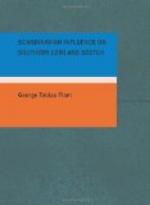WICHT, adj. strong, vigorous, skillful.
Bruce, VII, 263; Ramsay,
I 253. O.N. vigr,
fit for battle, skilled in war, from
vig, battle, Sw. vig,
active, M.E. wiht, valiant. B-S.
queries the word, but thinks
it may come from M.L.G. wicht,
heavy, thus the same word
as Eng. weight. This meaning is,
however, not satisfactory.
The Sco. usage is that of the
Scand. word. The t
is inflectional. Cp. O.N. eiga vigt um.
WICK, vb. to make to turn, to strike off on
the side, strike a
stone in an oblique direction,
a term in curling, to hit the
corner (Wagner). O.N.
vikja, to turn, to veer, Sw. dial.
vik, Sw. wika,
Norse vikja, vika, to turn (causative).
Dan. vige not quite
the same word.
WILKATT, sb. a wild cat, Dalr., I, 723.
Ramsay II, 500. O.N.
vill + Eng., Norse
cat, kat.
WILL, VILL, adj. adv. lost, bewildered, astray.
Dunbar, 228, 74;
Douglas, II, 24, 6, “to
go will.” O.N. villr, bewildered,
fara villt, get lost,
Norse vill, astray, Dan. vild, Sw.
vill. Cp.
Cu. wills, doubts, “Aaz i’ wills
whether to gang
or nit.”
WILRONE, sb. a wild boar. Scott, 71, 106.
O.N. vill, wild, +
runi, a boar, a wild
boar, Norse rone, raane, Sw. dial.
rane, Dan., with metathesis,
orne.
WILSUM, adj. errant, wandering. Douglas,
II, 65, 16; “a wilsome
way,” “Freires
of Berwick,” 410. See will, astray.
Wilsum
more frequently means “willful,”
is Eng.
WISSLE, VISSIL, WYSSIL. Douglas, III, 225, 8;
Bruce, XII, 580;
Montg., F., 578. O.N.
vixla, to cross, to put across,
vixlingr, a changeling
(Cl. and V.), Norse veksla,
vessla, to exchange,
Dan. veksle. Sco. and Norse both show
the change of ks to
ss. The Norse form versla shows
later dissimilation of ss
to rs. This is W.Norse.
WITTIR, sb. a sign. Douglas, II, 231, 16. See wittering.
WITTERING, VITTERING, sb. information, knowledge.
Bruce, IV, 562;
Douglas, II, 185, 27.
O.N. vitring, revelation, from vb.
vitra, to reveal.
Norse vitring, information, M.E.
witering, id.
WELTER, sb. an overturning. Winyet, I,
49, 22. See the vb.
welter.
PART III.
1. THE DIALECTAL PROVENIENCE OF LOANWORDS.
The general character of the Scand. loanwords in Sco. is Norse, not Dan. This is shown by (a) A number of words that either do not exist in Dan. or else have in Sco. a distinctively W. Scand. sense; (b) Words with a W. Scand. form.




